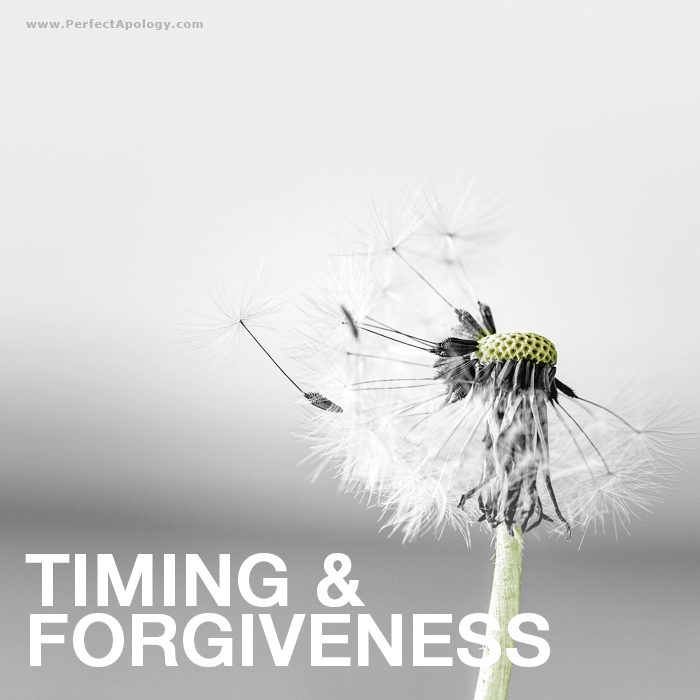Timing, Forgiveness & Apologies
Timing and forgiveness play off of each other when apologizing. So what's the relationship between timing and the chances of success in being forgiven?

Now that we understand the ingredients required for an effective apology and the importance in how we deliver it, let's look at another element that can help you obtain that ultimate goal of forgiveness—Timing.
Although it's not an ingredient itself, timing can contribute significantly to the success of an apology and forgiveness, especially in personal relationships.
Why is timing important when apologizing? Delays can compound the original issue and make the injured party less open to forgiving you.
On the other hand, instant apologies often risk being viewed as insincere and thoughtless.
The important point here is that timing and forgiveness are closely related. A simple error in judgement can, over time, quickly become a more serious problem in the absence of an apology.
Anyone can make a mistake, but if your mistake is compounded by the impression that you're also inconsiderate (for failing to realize you owe an apology) then the problem can get worse. Now the simple apology that would almost certainly have been sufficient if delivered quickly, will now make things worse.
An obvious a lack of caring from a poorly timed apology can make hurt feelings transform into the impression that you have complete disregard for others' feelings—a serious character flaw which can have long term implications on a relationship.
Given that, there are very few occasions, when dealing with personal relationships and forgiveness, that it makes sense to hold off on saying I'm sorry and apologizing.
![]()
The Timing of An Apology Can Increase Chances of Forgiveness
To illustrate the effect that timing has on forgiveness we'll use the following example:
John says something unintentionally that hurts Mary's feelings. Mary leaves the room visibly distressed.
NOTE: We'll assume that in all cases John has adhered to the guidelines of a perfect apology and understands the Science & Art of an apology .
What's the relationship between the length of time John takes to apologize and how easily he will be forgiven? What is the correlation between timing and forgiveness?
1. If John immediately follows Mary and says he's sorry, Mary will likely be more receptive to listening and forgiving him.
Why? Because the incident happened only seconds before.
Mary, although hurt by the remark that John made, now understands that it was an unintentional comment and that John never meant to hurt her in any way. Regardless of his intentions, John takes responsibility for Mary's hurt feelings and acknowledges being the cause of her reaction.
By John immediately reacting to Mary's distress, it signals to her that she and her feelings are important to him.
2. If John waits a couple of days to apologize, Mary will likely be less open to immediately forgiving him.
Mary has now spent the last 48 hours hurt and thinking about the situation. At the very worst, she assumes that John intended to hurt her. At best, she's thinking that although he may not have meant to hurt her feelings he obviously doesn't care for her enough to apologize.
3. What happens if John waits even longer?
Mary's hurt grows due not only to the original comment made by John but also by his lack of respect, understanding, and caring for her. She is now more likely to think that he meant to hurt her since he has made no sign that he feels badly for what he said.
The original comment may also now turn into a catalyst for larger issues in their relationship as Mary waits for an apology and time goes by. When and if John does finally apologize he may need to extend two apologies—one for the original incident and one to explain the delay in apologizing.
In all three cases, timing and forgiveness in relationships are connected in some way. The more time passes, the more closed the door to forgiveness may become.
When to Wait Before Apologizing
There are however a few cases that may warrant a delay when apologizing:
In personal relationships—if the infraction was major, the offended party may need time to cool off. Then delaying your apology may provide the time needed for the recipient to be more open to forgiveness.
In business—If the incident could result in ANY form of legal action or liability with ANY party then delaying a response or ANY form of business apology to seek the legal advice of an attorney is VERY prudent.
![]()
Given the same set of circumstances we can see that the timing of an apology not only affects how it's perceived but may also compound the original incident into larger issues. That's why we believe that there is a correlation between timing and forgiveness.
So act fast, make amends and apologize!
Visit our apology DOs and DON'Ts pages for some quick tips on improving your chances of being forgiven.


